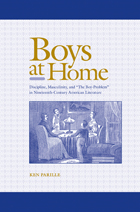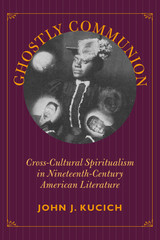
In this groundbreaking book, Ken Parille seeks to do for nineteenth-century boys what the past three decades of scholarship have done for girls: show how the complexities of the fiction and educational materials written about them reflect the lives they lived. While most studies of nineteenth-century boyhood have focused on post-Civil War male novelists, Parille explores a broader archive of writings by male and female authors, extending from 1830-1885.
Boys at Home offers a series of arguments about five pedagogical modes: play-adventure, corporal punishment, sympathy, shame, and reading. The first chapter demonstrates that, rather than encouraging boys to escape the bonds of domesticity, scenes of play in boys’ novels reproduce values associated with the home. Chapter 2 argues that debates about corporal punishment are crucial sources for the culture’s ideas about gender difference and pedagogical practice. In chapter 3, “The Medicine of Sympathy,” Parille examines the affective nature of mother-daughter and mother-son bonds, emphasizing the special difficulties that “boy-nature” posed for women. The fourth chapter uses boys’ conduct literature and Louisa May Alcott’s Little Women – the preeminent chronicle of girlhood in the century – to investigate not only Alcott’s fictional representations of shame-centered discipline but also pervasive cultural narratives about what it means to “be a man.” Focusing on works by Lydia Sigourney and Francis Forrester, the final chapter considers arguments about the effects that fictional, historical, and biographical narratives had on a boy’s sense of himself and his masculinity.
Boys at Home is an important contribution to the emerging field of masculinity studies. In addition, this provocative volume brings new insight to the study of childhood, women’s writing, and American culture.
Ken Parille is assistant professor of English at East Carolina University. His articles have appeared in Children’s Literature, Tulsa Studies in Women’s Literature, Papers on Language and Literature, and Children’s Literature Association Quarterly.


When critics of poet Phillis Wheatley, the first African American to publish a collection of poetry, dismiss her work as derivative, they fail to see her writing as part of a new creative pantheon, sitting alongside other works that, like the popular copybooks in antebellum America, are structured as a conversation between artistic allies. Different kinds of copying in this period were distinctly feminized practices, such as artistic copying, pedagogical recitation, and literary imitation. Ekphrasis, the literary description of a work of visual art, reveals a particularly interesting form of copying, as the artwork in question becomes a kind of mediated space between author and reader; this practice, then, becomes the emblematic form of literature as collective production.
Original Copy frames ekphrasis and other forms of literary and visual copy-work as key concepts for understanding the discussions of nationalism, originality, and gender that dominated US literary circles during the first half of the nineteenth century. Christa Holm Vogelius focuses on four major writers of the period—Phillis Wheatley, Margaret Fuller, Sophia Hawthorne, and Henry Longfellow—to offer a narrative of a self-consciously feminine antebellum literary culture that was equally invested in literary nationality and convention. The explicitly feminized forms of the copy between and within media, she argues, became a productive means by which writers across a variety of genres interrogated the ill-defined but ubiquitous idea of an “original” American literature. Original Copy bridges three bodies of scholarship that have remained largely distinct—studies of literary nationalism and transnationalism, scholarship on gender in nineteenth century literary culture, and aesthetic and media theory—to argue for the significance of both imitation and intimate author-reader relations to the development of an American literature.
READERS
Browse our collection.
PUBLISHERS
See BiblioVault's publisher services.
STUDENT SERVICES
Files for college accessibility offices.
UChicago Accessibility Resources
home | accessibility | search | about | contact us
BiblioVault ® 2001 - 2024
The University of Chicago Press









